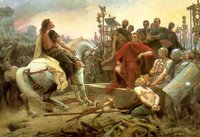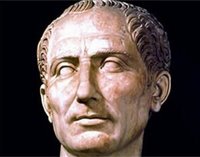The Julio-Claudian Emperors (Extra Credit)
 Suetonius' Lives of the Caesars is one of the most important sources for the early days of the Principate. Suetonius includes all sorts of fascinating biographical details about the men he describes--along with plenty of sometimes unverifiable gossip and rumor.
Suetonius' Lives of the Caesars is one of the most important sources for the early days of the Principate. Suetonius includes all sorts of fascinating biographical details about the men he describes--along with plenty of sometimes unverifiable gossip and rumor.For extra credit, please read Suetonius' account of Augustus, Tiberius, Gaius (Caligula), Claudius, or Nero. Pick a line that illustrates particularly well either the emperor's achievements or the way in which that emperor's life was a personal traagedy, or a tragedy for the people of Rome.




